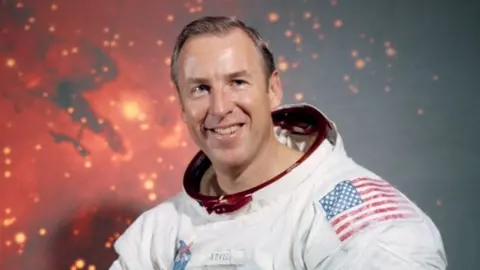Jim Lovell, the legendary astronaut who famously commanded the Apollo 13 mission, passed away at the age of 97. His remarkable journey in space exploration was marked by both extraordinary achievements and near-catastrophic events. Born on March 25, 1928, Lovell’s life witnessed significant milestones in aviation and space exploration, particularly as he became a household name following a dramatic mission that turned into a harrowing rescue effort in space.
Lovell’s prominent contribution to NASA came during the Apollo 13 mission in 1970. This mission was intended to land on the Moon, but a critical explosion occurred aboard the spacecraft when they were far from home. Lovell’s adept leadership during the crisis transformed what could have been a tragedy into a story of survival and human ingenuity. The world watched with bated breath as he and his crew, consisting of Fred Haise and Jack Swigert, navigated a series of dire challenges. In a moment that would become iconic, Lovell transmitted the now-famous words, “Houston, we’ve had a problem,” alerting Mission Control to the catastrophic failure they faced.
Despite the imminent danger, Lovell’s experience and calm demeanor allowed the crew to safely return to Earth, splashing down in the Pacific Ocean on April 17, 1970. This mission became one of the most notable events in space history, illustrating not only the risks of space travel but also the resilience and resourcefulness of astronauts and NASA’s ground control team. NASA officials, including acting head Sean Duffy, lauded Lovell’s extraordinary ability to turn a potential tragedy into a monumental success, solidifying his legacy in the annals of space exploration.
Prior to Apollo 13, Lovell had already made significant contributions to the U.S. space program. He was part of Apollo 8, where he became the first person to orbit the Moon, albeit not land on its surface. Lovell’s journey into space was fueled by an early fascination with aviation and science, sparked during his childhood in Wisconsin. He famously recalled his early experiments with rocket-making as a teenager, demonstrating his inherent curiosity about beyond-our-world pursuits.
Growing up, Lovell faced personal hardships, losing his father at a young age. To lift his family out of financial struggles, Lovell turned to the United States Navy. He later won a spot in NASA’s prestigious astronaut program, overcoming health setbacks that almost derailed his dreams. Lovell was selected as one of the “New Nine,” a group of astronauts tasked with fulfilling President Kennedy’s goal to land a man on the Moon.
His narrative is also celebrated in popular culture. Notably, actor Tom Hanks portrayed Lovell in the 1995 film “Apollo 13,” which further captivated the public’s imagination about the mission. Hanks paid tribute to Lovell following his passing, highlighting the qualities that made Lovell a hero, as someone who dared to dream and lead others through extraordinary challenges. Lovell’s contributions did not only end with Apollo 13; he published “Lost Moon: The Perilous Voyage of Apollo 13,” which detailed his experiences and inspired the blockbuster film.
In the wake of Lovell’s death, many remembered not only his accomplishments but his character, as expressed by his family. They described him as an eternal optimist with a great sense of humor, someone who inspired others to believe they could achieve the impossible. Lovell’s life was a testament to human curiosity, resilience, and the continuous quest for exploration. His legacy will endure in the memories of space enthusiasts and future generations devoted to uncovering the mysteries of the cosmos.











